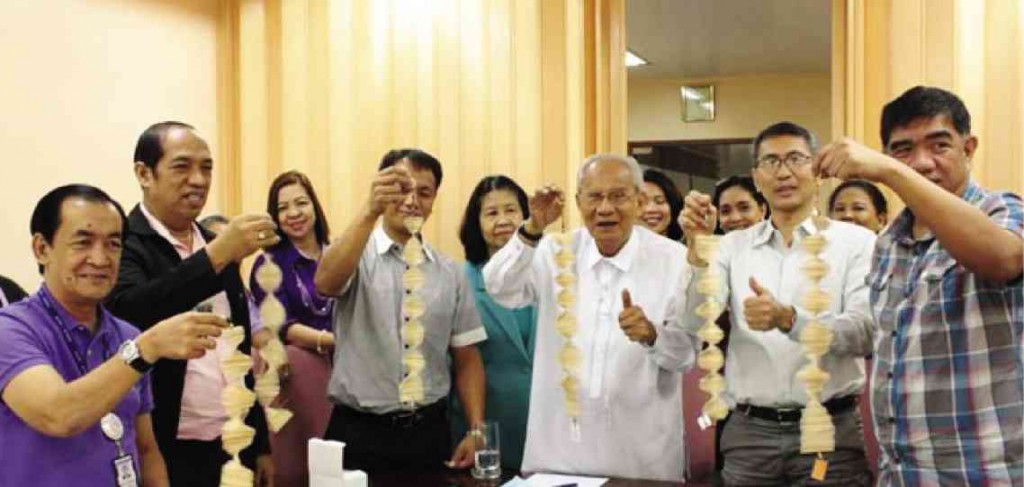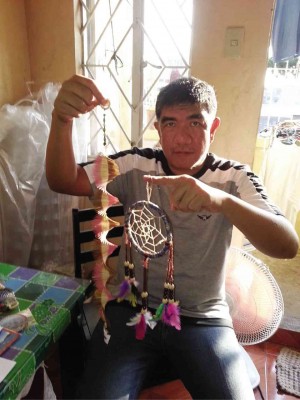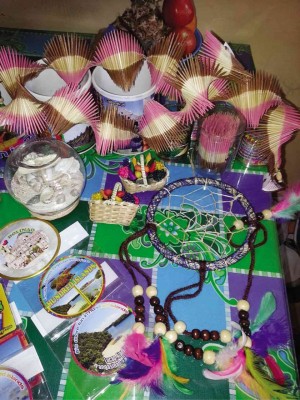‘Windcatcher’ for the wind-ravaged

PROJECT partners—from Bahaghari, SERDEF, DOLE and PESO offices of Marikina and Taguig— show off samples of the windcatcher. Proponent Jojo Navarro is at extreme right.
When Super Storm “Yolanda” barreled through most of the Visayas last November and took a horrific toll on lives, property, agriculture and business, many Filipinos were jolted into action. So great was the devastation many felt compelled to do more than pray, give a bit of cash, and send bags of relief goods.
Josefino “Jojo” Navarro, owner-manager of Bahaghari Handicrafts, remembered feeling a sense of despair as news of the destruction reached Manila. Single and without family obligations, he felt he had no business living a comfortable life in the metropolis, with a thriving enterprise, while thousands of kababayans were hungry and homeless.
It was around this time when one of his employees, Junas Jardonero, designed a new handicraft item. Shown the prototype, Jojo promptly tied it up with what he can to do for some of the victims: help them earn a living through craft production.
The product is made from bamboo toothpicks “woven” together to form a “mat,” 20 inches long, 2.5 inches wide. Twisted and hung, it spins with the wind, forming “circles in a spiral … in an ever spinning wheel,” as the song goes.
Jojo named the new product “windcatcher.” He imagined “catching the wind and converting it into a handicraft that gives hope to the wind-ravaged.”
Twenty years in the handicraft industry has developed in Jojo a feel of what will click with or flop in the market. He felt sure he had a winner in the windcatcher.
When he approached the Small Enterprises Research and Development Foundation (Serdef) for help in reaching Yolanda evacuees in Manila and organizing them into production groups, he had some basic premises thought out: Windcatcher would sell because he has a ready market. It would sell because of novelty and ornamental values and the social premium that comes from being crafted by disadvantaged folks.
Jojo is not new to working with the disadvantaged.
At the University of the Philippines Diliman, where he enrolled in B.S. Math after graduating from the Philippine Science High School in 1980, he was immediately drawn to student activism. Going to the barrios and getting immersed in the lives of the poor resonated with him. “I found I was pangmasa and wanted to live my life for others.”
Distracted from his studies, he left UP in 1982. He went back in 1986, shifting to a course in B.S. Psychology, but didn’t graduate despite completing academic requirements. He couldn’t enrol in ROTC (Reserved Officers Training Course, then compulsory for boys), unable to forget he was once hit with a policeman’s truncheon in a rally.
In 1988, he joined a refugee camp in Morong, Bataan as a case worker, processing United States-bound Vietnamese refugees. The facility closed in 1992.
He worked again two years later in similar camps in Bangkok, Malaysia, and Indonesia.
Back in the Philippines in 1994, he set up Bahaghari Handicrafts.
He first learned the ropes of the crafts trade from a friend who was experienced in it. They became business partners after Jojo came back from Morong. “We had a falling out just before I left for Bangkok,” he recalls “but not before I had learned enough of the business.”
Based in Kaunlaran Village, Malabon City, Bahaghari produces a variety of items, including tiny baskets, refrigerator magnets, mugs, shot glasses, key chains—items that would remind travelers of the place they visited. It has another decorative hanger called “dreamcatcher” vaunted to shield against nightmares.
His products can be found in places where tourists abound—in Tagaytay, Pagudpud, Laoag, Vigan, Baguio, Bolinao, Hundred Islands, Puerto Galera, Puerto Princesa, El Nido. Also in Dumaguete, Bohol, Boracay. His next targets are Davao, Zamboanga, Albay, Camiguin, Cebu.
Jojo has developed his own business model.
Traditionally, retailers from the province get their merchandise from wholesalers in Quiapo. When they dealt with Bahaghari, they eliminated the middleman.
“They have everything to gain. I have everything to lose. I trust they’d pay when the items are delivered.” So far, the arrangement has worked.
Bahaghari is not a name you will find in any of his products. “My retailers use their own labels. They prefer that I remain unknown. I understand that; I don’t compete with my own market.”
This way, he has established a wide distribution network, the same network that will be used in marketing windcatcher.
After producing samples from the windcatccher prototype, Jojo scouted around for a conduit to Yolanda survivors who have evacuated to Manila.
He found what he was looking for in Serdef which promptly put him in touch with government agencies that could help.
Last January, Jojo signed an agreement with representatives of Serdef, Department of Labor and Employment–National Capital Region (DOLE-NCR) and Public Employment Services Offices (PESOs) of the city governments of Marikina and Taguig to implement the “Windcatcher Home-based Livelihood Project.”
The beneficiaries were selected and organized by the Marikina and Taguig PESO offices from among evacuees residing in their respective communities.
Fifteen evacuees in Taguig and 20 in Marikina have so far been trained by Jojo and his Bahaghari staff.
Before February ended, most of the trainees have begun working from their homes and earning income.
The PESO offices supervise and monitor production, collect the finished products, and do payrolling.
The DOLE-NCR promotes the project with multi-media programs. Through its field offices, it monitors its implementation to ensure its sustainability.
Serdef supports Bahaghari with business counselling and promotional assistance through its Media Bureau.
Jojo reckons the homeworkers would take a while to achieve maximum productivity. When they do, they would be earning slightly more than the legislated minimum wage in Leyte.
He is happy with the quality of the output. “Quality standards are not so stringent, basta pantay at siksik ang gawa.”
He admits, however, that the ideal situation would be to go to Leyte and set up production there. “That way, the income goes to the local economy. To really help in the rehab effort, we’ve got to go there.”
But for that to happen, he needs local partners willing to invest.
(To get in touch with Bahaghari Handicrafts, call up tel 3915663 or e-mail [email protected]. For more entrepreneurial stories, visit the Serdef website at www.serdef.com.)
















